Book contents
- Frontmatter
- Dedication
- Contents
- List of Illustrations
- Notes on Contributors
- Preface
- Acknowledgments
- Part I Contexts
- Part II Genres
- Part III Figures
- 12 Walt Whitman
- 13 War and the Art of Writing: Emily Dickinson's Relational Aesthetics
- 14 Herman Melville and the Civilian Author
- 15 Looking at Lincoln
- 16 Frederick Douglass, Violence, and Abraham Lincoln
- 17 Mary Boykin Chesnut: Epic and Miniature
- 18 Mark Twain
- 19 Replay: William Faulkner and the Civil War
- 20 Robert Penn Warren's Civil War
- 21 Natasha Trethewey's Civil War
- 22 Afterword: Archiving the War
- Recommendations for Further Reading
- Index
15 - Looking at Lincoln
from Part III - Figures
Published online by Cambridge University Press: 05 December 2015
- Frontmatter
- Dedication
- Contents
- List of Illustrations
- Notes on Contributors
- Preface
- Acknowledgments
- Part I Contexts
- Part II Genres
- Part III Figures
- 12 Walt Whitman
- 13 War and the Art of Writing: Emily Dickinson's Relational Aesthetics
- 14 Herman Melville and the Civilian Author
- 15 Looking at Lincoln
- 16 Frederick Douglass, Violence, and Abraham Lincoln
- 17 Mary Boykin Chesnut: Epic and Miniature
- 18 Mark Twain
- 19 Replay: William Faulkner and the Civil War
- 20 Robert Penn Warren's Civil War
- 21 Natasha Trethewey's Civil War
- 22 Afterword: Archiving the War
- Recommendations for Further Reading
- Index
Summary
Words
To look at Abraham Lincoln is to discover a man so visible he can scarcely be seen. The paradox of that enhanced visibility might be increased by the way that his words are so familiar that we can scarcely hear him. To see Lincoln anew and to hear his words afresh becomes the challenge. This chapter considers how Lincoln appeared, stiff hair rising as a disheveled crown, top hat silhouetted above the crowd, when he was looked at by artists and writers. It also considers how Lincoln looked at himself, mocking his own appearance, and proposing at once rigorous and passionate systems of belief. To carry out attention to the visibility of Lincoln as a writer and politician, the chapter examines his orations as well as his written statements, listening to his words.
Abraham Lincoln first rose to regional prominence in rural Illinois as a lawyer whose commonsense rendering of convoluted land claims remains compelling reading. His ability to mock plaintiffs and defendants alike still emerges in the renderings of his speeches before the court. And yet the man who saw brief military service in the so-called Black Hawk War along the Mississippi River, the man who navigated rivers on a raft and saw slavery firsthand, scarcely appears to be the same man who produced the clipped eloquence of the Gettysburg Address.
How Lincoln wrote himself into existence retains a residue in the popular imagination in a register recorded from both oral and written performances. Contemporary anecdotes suggest that his speech could be coarse and even vulgar, while the classic texts with which he will be forever associated, such as the “Gettysburg Address” and the “Second Inaugural Address,” seem to have survived because of the circulation of newspaper accounts. To see Lincoln as a writer is to see someone who draws on Biblical cadences as well as the bawdy tall tales humor of the so-called southwest – a region he traveled on the Mississippi around the same time that Samuel Clemens was learning to pilot a steamboat. The words that remain show him to be both meticulous in his phrasing and certain that the lessons of history could produce a coherent strategy and an enduring set of beliefs. What persists, in the middle of such melancholy, urgent reasoning, and tall tale humor?
- Type
- Chapter
- Information
- A History of American Civil War Literature , pp. 227 - 241Publisher: Cambridge University PressPrint publication year: 2015



